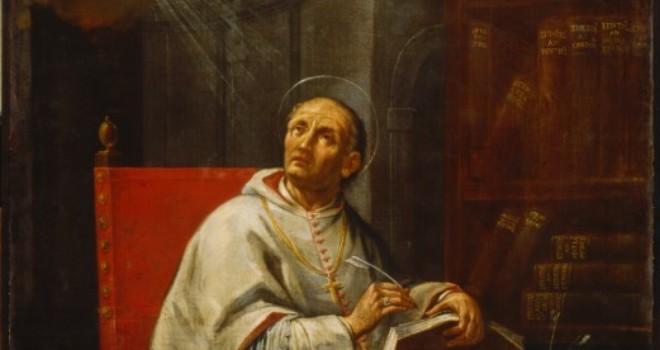St. Peter Damian
The medieval Italian bishop St. Peter Damian (1007-1072) was born in Ravenna, where his parents died when he was still young. Peter was first left with an older brother, who was very unkind and neglectful; later another brother cared for him, and arranged for him to be well educated. Peter became a professor, and in […]



The medieval Italian bishop St. Peter Damian (1007-1072) was born in Ravenna, where his parents died when he was still young. Peter was first left with an older brother, who was very unkind and neglectful; later another brother cared for him, and arranged for him to be well educated. Peter became a professor, and in 1035 he joined the Benedictine Order.
Peter soon gained a reputation for being generous to the poor; it was his custom to invite one or two poor persons to share his meals. In the monastery Peter practiced severe penances, going long periods without food or sleep and spending hours in prayer.
Eventually Peter became abbot of the monastery and devoted himself to fostering spiritual reform and renewal. The pope frequently asked him to mediate in disputes involving different monasteries or disagreements between local religious and government officials. Peter was then appointed bishop of Ostia (the port city of Rome), where he was vigorous in his efforts at reform; he restored discipline among his clergy and promoted a simpler, more spiritual lifestyle for his people.
He wrote many letters and sermons, but throughout this period he desired to return to the monastic life. This request was finally granted, but he was still called to serve as a papal legate from time to time. After returning from one such assignment, Peter was overcome by a fever. With his monks gathered around him in prayer, St. Peter Damian died on February 22, 1072; in 1828 he was declared a Doctor (an eminent and reliable teacher) of the Church.
Lessons
1. Personal experiences of suffering should make us sympathetic to others in need; St. Peter’s difficult childhood made him particularly mindful of the poor and lowly.
2. Holiness requires us to be both firm and gentle. St. Peter had a reputation for being quite impatient and critical with those who took religion casually, but he could also be very consoling and encouraging to those experiencing difficulty or sorrow.
From Johnnette Benkovic’s Graceful Living: Meditations to Help You Grow Closer to God Day by Day
“In serenity, look forward to the joy that follows sadness. Hope leads you to that joy and love enkindles your zeal.”
—From a letter of St. Peter Damien
Johnnette’s Meditation
The letter to the Hebrews tells us that “faith is the assurance of things hoped for, the conviction of things not seen” (11:1). How does this help me live out the advice of St. Peter Damien?
image: San Pedro Damiani by Andrea Barbiani / Classense Town Library, Public domain, via Wikimedia Commons















